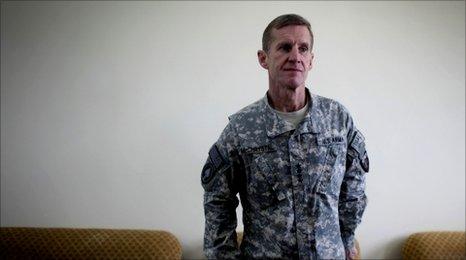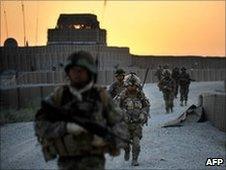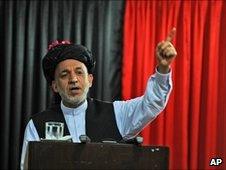Kabul to miss respected McChrystal
- Published

Afghan government officials said Gen McChrystal had won trust in Kabul
Gen Stanley McChrystal was far more popular in Kabul than he was in Washington.
Both President Karzai's office and the Afghan defence ministry spent the afternoon reiterating their support for the commander, but by the end of the day there was an acknowledgement that the counter-insurgency strategy in Afghanistan would continue without its chief architect.
Mr Karzai's spokesman, Wahid Omar, described Gen McChrystal as "an important and trusted partner for the Afghan government and the Afghan people".
"We hoped this wouldn't happen," he said in a statement.
President Karzai has closer ties to Gen McChrystal than to any other US official. They met every couple of days.
Mr Karzai even spoke to President Barack Obama via video conference earlier, and requested that the general be allowed to keep his job.
That support came despite comments from an aide to Gen McChrystal, published in the Rolling Stone article, describing the president as a "less than ideal partner," and saying Mr Karzai had been "locked up in his palace for the last year".
Building trust

Gen McChrystal's strategy aims to give greater responsibility to Afghans
The president's spokesman said that no apology had been received from the general, but that none was required as Gen McChrystal had won the trust of the Afghan government.
He did that by formulating his counter-insurgency strategy, or as it is known here, "the McChrystal plan" - in short a combination of increased troop numbers, greater protection for civilians, and more responsibility for Afghans.
This reinvention of the war, he hopes, will improve the chances of creating a functioning state and defeating the Taliban.
"We made some serious progress on civilian casualties, avoiding civilian casualties - this is one of the reasons why Gen McChrystal has managed to build lots of trust here in Afghanistan," said Mr Omar.
Gen McChrystal calls it insurgent mathematics - when Nato gets it wrong, the damage multiplies.
For every innocent killed, according to the general, 10 new enemies are created.
Saving civilian lives has certainly won Gen McChrystal more friends here in Kabul. But success on the battlefield has proved more illusive.
Long game
Counterinsurgency is a long game.

Mr Karzai said he wanted Gen McChrystal to remain in his post
And a key part of the general's strategy has still to be put into play.
"Kandahar is the cornerstone of this entire strategy," said Hekmat Karzai, from the Centre for Conflict and Peace Studies in Kabul.
"The Afghan government, along with [the Nato force] Isaf, the international community, has put together this strategy.
"The key effort really needs to be on the population, with tribal elders, to make sure we win the hearts and minds of the population.
"It would be very difficult to see this strategy implemented without General McChrystal".
But there was also an acknowledgement that many of the counter-insurgency techniques that formed the McChrystal plan were pioneered by General Petreaus in Iraq.
So the government in Kabul expects no significant change in military strategy.
The statement from the president ended by saying: "We are looking forward to working with General Petraeus, a very experienced soldier who President Karzai knows well."